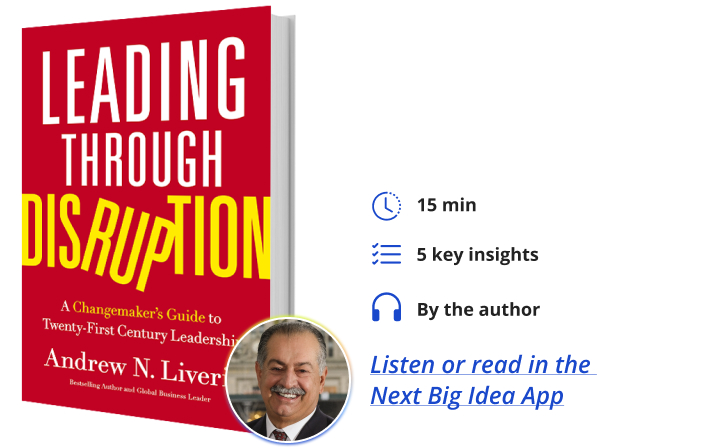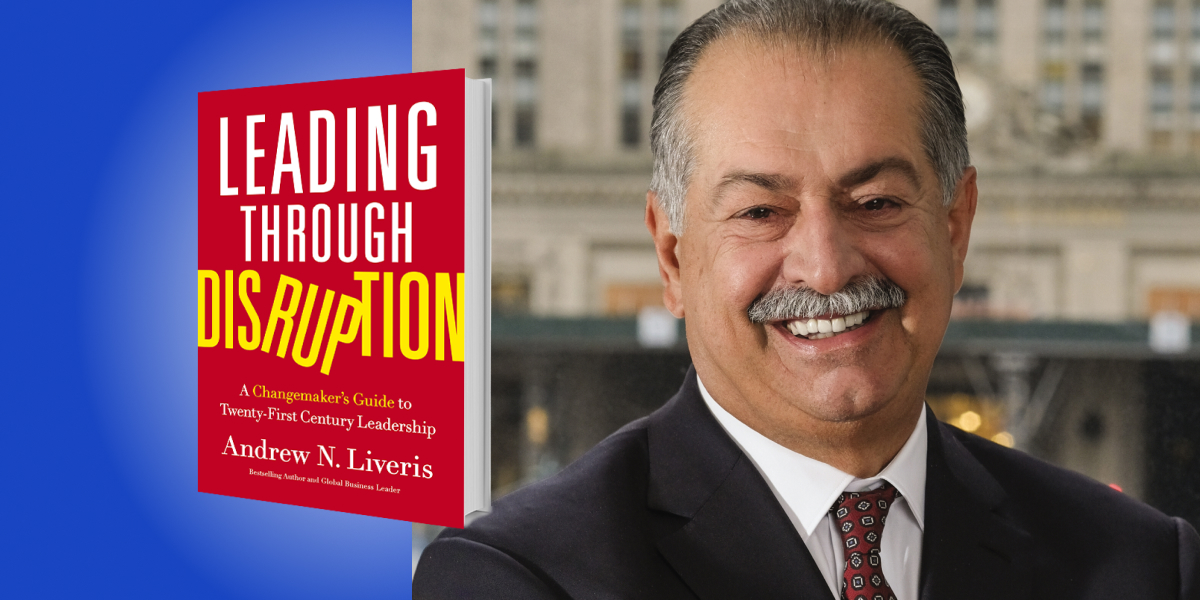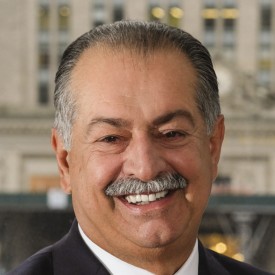Andrew Liveris is the former Chairman and Chief Executive Officer of the Dow Chemical Company and the former Executive Chairman of DowDuPont. He is Chairman of the Board of Lucid Motors and President of the Brisbane 2032 Organizing Committee for the Olympic and Paralympic Games. Previously he served as co-chair of President Obama’s Advanced Manufacturing Partnership steering committee, where he worked closely with President-elect Joe Biden, and as a member of the U President’s Export Council.
Below, Andrew shares five key insights from his new book, Leading through Disruption: A Changemaker’s Guide to Twenty-First Century Leadership. Listen to the audio version—read by Andrew himself—in the Next Big Idea App.

1. ESG (Environment, Social & Government) and Inclusive Capitalism.
Environment, Social, and Governance are all aspects of the new leadership paradigm. As part of the new leadership paradigm, there are five response mechanisms while facing issues (for example, climate change). The first of “The Five Ds” is denial; when we go into our little boxes and deny everyone else’s point of view. The second “D” is defiance, where we say things like, “What we are doing is right and what you want to do doesn’t make any sense.” As the process continues, we get to discussion, debate, and finally, doing something about it.
What’s another new way of operating? The role of inclusive capitalism is this notion that environment, social, and governance paradigms are very much part of stakeholder management. Inclusive capitalism is the model for purpose and for profit as it relates to capitalism in the 20th-century definition. In this realm, we talk a lot about capitalism in democracies. But capitalism has come alive in China also, a country that has obviously formed a communist state. How do we lift capitalism as enterprises, businesses, and governments, so everyone can enjoy the benefits of the investments that we all make in the common good? And how does inclusive capitalism fit into that?
2. New role of boards.
We used to appoint boards with people that we knew, people we were friendly with, also known as country club boards. These days, the paradigm shift that came from inclusive capitalism says, “Just a second, your owners are demanding a new profit picture based on short-term profits.” Now, boards absolutely need to understand that the new role of owners is no longer just the role of the financial owners, but includes the notion of a SLO (Societal License to Operate.) SLO means that the role of inclusive capitalism dictates how to make profits in an enterprise and not through short-termism, but long-termism.
“The new role of boards is to understand contextually what is happening in the ecosystem of society.”
New boards now need to go through a long-term process of engagement, activism to enlightenment. The new role of boards is to understand contextually what is happening in the ecosystem of society. It brings different types of people onto your board that understand not just content, but context. A new board can understand how we put together answers to the new stakeholder management that inclusive capitalism drove. The new role of boards, the new common good, and the new role of inclusive capitalism mean that we can segue into a discussion around the rate and pace of change in the business world.
3. Geopolitics is changing in the new century.
The model of geopolitics in the 20th century calls one system of government socialism and left-wing government, and the other system of government right wing. The right-wing favors financial outcomes that benefit the ones who work hard.
In the 21st-century paradigm, we are trying to find a way to understand how systems can interact with each other. We are breaking apart the notion that the U.S. should be the consumer and China should be the producer, that multilateralism and trade discussions need to move to the new paradigm. New alliance structures based on communities and regions now have to have aligned values and purposes.
4. The new role of government.
Governments are full of people who are elected by voters for the short term. Enterprises need to engage governments to help the content of what they’re regulating be understood.
The oxymoron of the word “smart” and the word “regulation” comes to the table. What does “smart regulation” look like in the world of a tectonic shift in the digital world? How do we regulate this emergence of AI? And what is the content of our work of government? How do we instruct it so we get a better answer for all of society? And what does that look like?
“Smarter regulations should make it easier for the common good to be made available to all of society.”
That’s an example of the new role of government. Whom do we elect? How do we elect them and what should we be demanding if we elect people who have an understanding of some of this? How do we help, advise, and instruct them? I have instructed three U.S. presidents and many governments around the world. In this realm, discussions took place about what regulations should look like, in order to raise the bar for everybody. Smarter regulations should make it easier for the common good to be made available to all of society. Clearly, there are instruments like tax, regulation, tariffs, and trade rules—all of these are 20th-century rules. In the 21st century, the role of government should evolve to lift up all of its citizens.
5. The new role of science.
Being a scientist and an engineer myself, I really believe in facts. There exists a misunderstanding of the role of science in the world of technology. Tech companies are doing a great job of giving us new ways of interacting with each other. But how do we actually solve some of the ills of today, like pollution, plastics in the ocean, and poverty? How do we ensure that people have access to water and electricity that’s affordable? How do we transition energy from fossil fuels to renewables when most of society is living below the poverty line?
We should all be playing a part in the ecosystem of getting fact-based decision-making, using science as the cornerstone. I’ve heard it said that it’s not science if you have to use the word science after it, like with marketing science or social science. The science I’m talking about is the science that underpins all of our decisions in math, physics, chemistry, and biology. If you think about biology and the marriage of computation—and what we can do to make us all live longer and healthier—that should be made available to all of humanity.
Going forward, the role of corporations and the role of advanced societies can bring together new institutions wherein there exists a solution space. We can create some new institutions to take the role of science to a new level. Leading in this new world means building teams that allow you to get that done.
“We should all be playing a part in the ecosystem of getting fact-based decision-making, using science as the cornerstone.”
The new normal, (or the new abnormal) is here to stay, and as a result of that, the new tomorrow has to embrace a new type of leadership style. A new leader drives a car while looking through the windshield to see where we’re going, but also scans the side mirrors and looks at the rearview mirror to see where they’ve been.
Similarly, if you’re a pilot in the front of the plane and you hit turbulence, what do you do? You take the plane off autopilot and use your own senses to cope with the disturbance that’s in front of you. That combination of being able to use the human system and the human-built systems is the reality of the new tomorrow.
The next generation of leaders cannot be categorized into the 20th century. Categorize yourself into the century we are in and accept it. Do fact-based analysis on decision making, and then decide to get it done.
To listen to the audio version read by author Andrew Liveris, download the Next Big Idea App today:
































